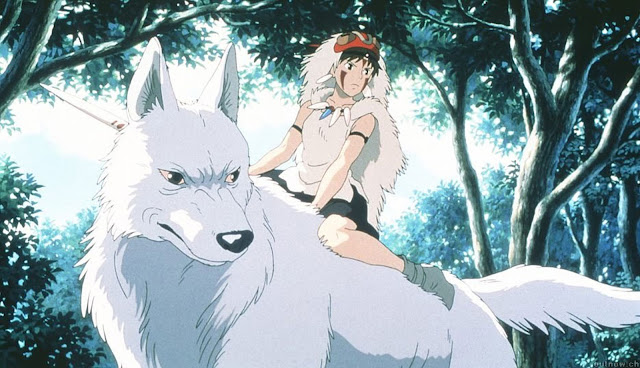An anime has become more a subject for academic and considered as 'high culture'. The film 'Princess Mononoke' is very useful especially on subjects like feminist, sexuality thoughts and men's attitudes towards ecology (nature). Napier (2005) stated that "Princess Mononoke' problematizes archetypes and icons, ranging from the notion of the emperor's untouchability to the traditional iconization of the feminine." For example, both characters Lady Eboshi and San (wolf girl) familiarize the feminine.
This film shows that nobody is truly good or bad person. Both nature and human are trying to eliminate each other for their livings. There certainly is a overarching of pure good and pure evil like Forest Spirit, and hatred (curse that was infected the boar named Nago, and on the Ashitaka's arm.)
Reference
Napier, S. (2005). Anime: from Akira to Howl’s Moving Castle. Hampshire: Palgrave Macmillan.


I agree with your opinion that Miyazaki is trying to say that there isnt really a 'bad guy'in Princess Mononoke. The conflict between the nature and the human world is drawn through out this animation however, in the real world we do not have the nature's point of view whereas inside the film Mononoke is in the nature side with a human body and have her say about how humans are destroying the forest. The film definitely shows the curse within the human and the nature where they need to form the relationship to get rid of the curse and live peacefully.
ReplyDeleteand I think Princess Mononoke is an attractive character for both male and female. She's a character who is between a boy and a girl who is trying to survive to live in the forest. It appeals to me that she's not a typical weak female character who needs help from others but tries to fight for herself and to help her family (forest).
ReplyDeleteI love the movie !
For example, both characters Lady Eboshi and San (wolf girl) familiarize the feminine.
ReplyDeleteI think you mean de-familiarize
Also, when you say man must destroy nature in order to live, is that what you think or what you are claiming Miyazaki thinks - an important distinction.
Doesn't Ashitake plea for harmony between man and nature, a very real challenge for us in the 21st Century.
I like your comments May Kim. I'm sure the girl San appeals to many girls and women for the very reason you put forward! That may help account for the popularity of the film - a strong feisty girl!
ReplyDeleteYes i definitely agree. i also believe though that theres a point Miyazaki makes about humans and how we destroy the land. with the use of the deer god she/he is the symbol of nature and i was reminded of the saying "be careful where you tread". This is because wherever the deer god stood, flowers grew, bloomed, then starts wilting and die which represented the full cycle of life (birth to death). the point i believe Miyazaki makes is that there must be balance between nature and man because we also have the power to destroy each other. but at the same time man instigates and man should be careful to what changes (wherever it maybe) is made to the land
ReplyDeleteWell said, Matkpt. Perhaps you all would like to comment on how these themes are resolved or not by the way the film ends.
ReplyDeleteThanks for these comments! I agree with Matkpt that 'the point Miyazaki makes is that there must be balance between nature and man because we also have the power to destroy each other'. This was what I wanted to say for my post!
ReplyDelete